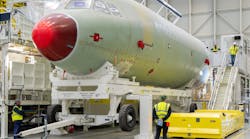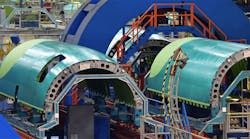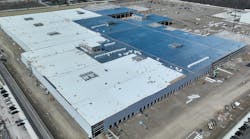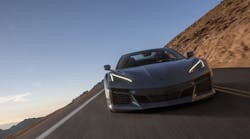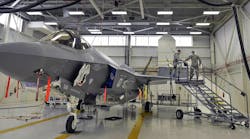Mori Seiki uses an auto-campsite assembly system where machines remain stationary while parts and labor come to them.
A new machining plant at Mori Seiki’s Chiba, Japan, facility manufactures the company’s octagon-shaped machine rams.
Mori Seiki makes its own ballscrews, spindles and turrets at the company’s Iga, Japan, plant.
As part of an initiative to bring more outsourced work back in-house, Mori Seiki opened a heat-treating plant at its Iga, Japan, campus
About 32 bridge mills, running unmanned practically 24/7, machine cast iron castings at Mori Seiki’s Iga, Japan, plant.
Mori Seiki’s Nara, Japan, plant manufactures the company’s NMV5000 vertical machines featuring rotary tables with B and C axes.
Mori Seiki has entered the entry-level-machine market with its DuraVertical machines built at the company’s Nara, Japan, campus.
The wheels are in motion at Mori Seiki as the machine tool company sets its sights on producing 800 machine tools per month in 2007. To achieve its goal, the company has instituted a company-wide initiative aimed at optimizing quality and delivery times while speeding production. Key components of that initiative include bringing a lot of out-sourced work back in-house, incorporating special manufacturing techniques, opening new plants and expanding existing ones.
Most of today's manufacturers, such as the automobile companies, strive to lower costs and increase production by outsourcing as much work as possible to suppliers, but Mori Seki (www.moriseikius.com) is doing just the opposite. For example, the company makes its own spindles, ballscrews and turrets. Many other machine builders purchase these components from outside vendors. Mori Seiki also does its own heat treating, casting and sheet metal work, all of which was farmed out previously.
Each of Mori Seiki's three plants in Japan and its newly acquired production plant in Switzerland is expected to play a key role in reaching the company's 2007 production goals. Mori Seiki's Chiba, Japan, plant, for example, recently increased capacity with the addition of a new building dedicated to machining castings and the company's octagon-shaped rams. A second new machine shop is to open soon at the Chiba location.
Smallest of the three Japanese Mori Seiki campuses, Chiba produces the company's big, complex multi-axis turning centers, including the NT Series of integrated machines. Its production capacity is about 50 units per month. To speed production, Chiba uses an auto-campsite assembly system. Unlike in a moving assembly line, machines in an auto-campsite assembly environment remain stationary while components, parts and labor come to them.
Mori Seiki's largest general production campus in terms of size and facilities is located in Iga, Japan. At the plant, the company manufactures its CNC lathes, vertical machining centers and horizontal machining centers at a production rate of about 450 units per month. More importantly, the Iga plant has had a primary role in Mori Seiki's recent 30 percent increase in in-house manufacturing.
Iga produces spindles, ballscrews and turrets used by all of Mori Seiki's manufacturing facilities. It also houses the company's recently opened heat treating, casting and sheet metal plants. By doing its own heat treating, Mori Seiki reduces its carburizing time from 8.9 days (outsourced) to 3 days (in-house), ion-nitriding from 7 days to 3 days and its high-frequency induction hardening from 4.6 days down to one day.
The Iga casting plant produces 200 tons of cast iron per month using a full-mold method (Styrofoam instead of wood), mostly for prototype/test machines. By casting its own components, the company speeds time-to-market for new machines.
Completed in October of 2006, the Iga sheet metal plant bends and machines sheet metal for 35 percent of the company's machines and 50 percent of its machine electrical cabinets.
In the Iga machining plant, 32 large bridge-type mills machine cast iron components 24/7. For the most part, the machines run unmanned with the help of automatic work-changing capabilities. Operators attend the machines during the first shift to do setup work and to adjust tooling so the machines can run unattended overnight. Each operator keeps two machines up and running.
Mori Seiki's Nara, Japan, campus specializes in the company's compact lathes and machining centers and its Dura vertical series of entry-level-model machines. The company produces 240 units per month at its Nara facility, including its new NMV5000 machining center that features a high-speed rotary-table that rotates 170-degrees in its B axis and 360-degrees in the C axis. Mori Seiki's Nara plant operates much like its Iga plant (24/7), but local restrictions prohibit Mori Seiki from expanding the Nara plant.
In addition to its three Japanese campuses, Mori Seiki recently expanded its production capacity with the acquisition of Dixi Machines S.A. in Switzerland. The Dixi facility is Mori Seiki's first manufacturing facility outside of Japan. Dixi manufactures jig machines and machining centers, and Mori Seiki plans to continue to use the Dixi name. However, Mori Seiki also plans to build its own machines at the Swiss plant. Dr. Masahiko Mori, president of Mori Seiki, said the Dixi plant will help his company to expand its presence in the European market.








